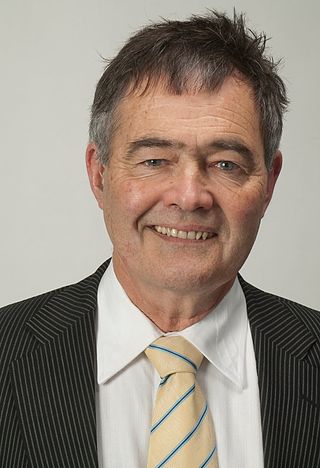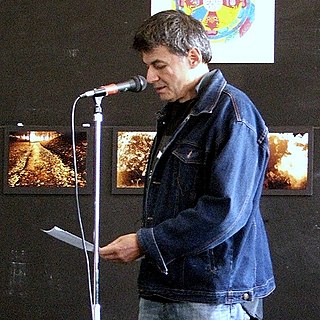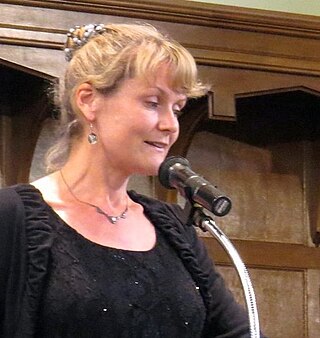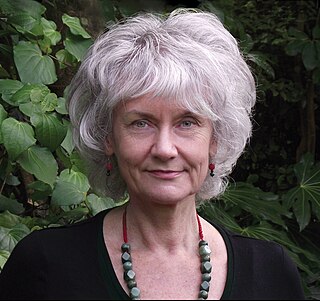
Dunedin is the second-largest city in the South Island of New Zealand, and the principal city of the Otago region. Its name comes from Dùn Èideann, the Scottish Gaelic name for Edinburgh, the capital of Scotland. The city has a rich Māori, Scottish, and Chinese heritage.

Priscilla Muriel McQueen is a New Zealand poet and three-time winner of the New Zealand Book Award for Poetry.
The Frances Hodgkins Fellowship, established in 1962, is one of New Zealand's premier arts residencies. The list of past fellows includes many of New Zealand's most notable artists.
Alison Wong is a New Zealand poet and novelist of Chinese heritage. Her background in mathematics comes across in her poetry, not as a subject, but in the careful formulation of words to white space and precision. She has a son with New Zealand poet Linzy Forbes. She now lives in Geelong. She is a 2024 Arts Foundation Te Tumu Toi Laureate.

Brian Lindsay Turner is a New Zealand poet and author. He played hockey for New Zealand in the 1960s; senior cricket in Dunedin and Wellington; and was a veteran road cyclist of note. His mountaineering experience includes an ascent of a number of major peaks including Aoraki / Mount Cook.
O.E. Middleton was a New Zealand writer of short stories, described as belonging to the vernacular critical realist tradition of Frank Sargeson. He was the brother of noted New Zealand novelist Ian Middleton, and like him also blind from middle age. Mentored by Frank Sargeson in Auckland in the late 1950s, he moved to Dunedin to take up the Robert Burns Fellowship (1970) at the University of Otago.

David Charles Cull was the mayor of the city of Dunedin in New Zealand. He became the 57th Mayor of Dunedin in October 2010 and was re-elected in both the 2013 mayoralty race and 2016 mayoral election. Before politics, he was a presenter for Television New Zealand and an author.

Fiona Farrell is a New Zealand poet, fiction and non-fiction writer and playwright.

David Eggleton is a New Zealand poet, critic and writer. Eggleton has been awarded the Ockham New Zealand Book Award for poetry and in 2019 was appointed New Zealand Poet Laureate, a title he held until 2022. Eggleton's work has appeared in a multitude of publications in New Zealand and he has released over 18 poetry books (1986–2001) with a variety of publishers, including Penguin.

Sue Wootton is a New Zealand writer, specialising in poetry and short fiction.
Robert Lord was the first New Zealand professional playwright. He was one of the first New Zealand playwrights to have plays produced abroad since Merton Hodge in the 1930s.

Emma Neale is a novelist and poet from New Zealand.
Elspeth Somerville Sandys is a New Zealand author and script writer.

Diane Edith Brown is a novelist and poet from New Zealand.

Barbara Helen Else, also known as Barbara Neale, is a New Zealand writer, editor, and playwright. She has written novels for adults and children, plays, short stories and articles and has edited anthologies of children's stories. She has received a number of awards and fellowships including the New Zealand Order of Merit for services to literature, the Storylines Margaret Mahy Medal and the Victoria University of Wellington's Writer's Fellowship.
The University of Otago College of Education/Creative New Zealand Children's Writer in Residence is a six-month Fellowship for children's writers who normally live in New Zealand.

Robyn Belton is an illustrator of children's books. Her work, often focusing on themes of war and peace, has won many prizes, including the New Zealand Post Children's Book Awards 1997 Picture Book Winner and Book of the Year, and the Russell Clark Award in 1985 and 2009. She herself has been recognised with the prestigious Storylines Margaret Mahy Award and the inaugural Ignition Children's Book Festival Award. She lives in Otago, New Zealand.

Lloyd Spencer Davis is a New Zealand-based author, filmmaker, scientist and science communicator. Born in Napier in 1954, he is known particularly for his creative nonfiction writing about science and nature subjects. He has published ten books and been co-editor of another two, as well as authoring over 150 scientific papers.

Atholl John Anderson is a New Zealand archaeologist who has worked extensively in New Zealand and the Pacific. His work is notable for its syntheses of history, biology, ethnography and archaeological evidence. He made a major contribution to the evidence given by the iwi (tribe) Ngāi Tahu to the Waitangi Tribunal.













